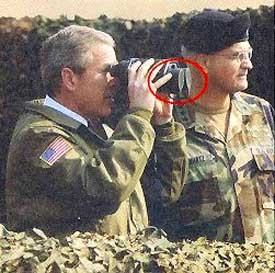Clearance Moratorium Hurting US Security
Pentagon stopped processing security clearances
blaming insufficient funds. The moratorium is starting to threaten the nation's
security.

So, how far ahead can you see — when you leave on the lens caps?
The Pentagon has stopped processing security clearances for military contractors. They say they can’t afford it.
The shock decision by the Defense Security Service — the Pentagon agency that handles applications from contractors who need clearances to do classified work for the U.S. government — was announced late last month, but has attracted surprisingly little notice, perhaps because the armed services committees of both chambers of Congress were busy last week marking up their gargantuan authorization bill.
in 2001, [the Defense Security Service] received 105,000 applications for the whole year. The demand for clearances for private sector contractors has grown hugely since the Sept. 11 attacks, driven by the tsunami of spending that Congress has approved for U.S. military operations and the broader war on terror.
By 2005, officials said, the agency was receiving 142,000 applications a year, and the backlog was well over a quarter million. The agency received 103,000 applications in the six months between October 2005 and March 2006
When Bush signed the Intelligence Reform and Terrorism Prevention Act of 2004, he was still trying to convince everyone the mission was accomplished. The bill created the Director of National Intelligence and he turned the job over to NSA honcho, John Negroponte. Individual budgets were cut because the new system was going to save time and money.
Market analysts said the cut would likely turn out to be a false economy. The Department of Defense “is probably paying multiple times in salary costs what it saves in starving (the Defense Security Service’s) budget,” Teal Group aerospace analyst Joel Johnson told MarketWatch News last week.
He said the bottleneck in getting new clearances distorted the labor market by driving up wages for those who already have them. Many companies in the sector already offer large signing bonuses to new hires with clearances.
“Like with oil, scarcity leads to speculation and high commodity prices — e.g. salaries,” Johnson said.
In December 2004, Bush thanked Senators Collins and Lieberman, Porter Goss, Condi Rice and others for their help with this law — because “our vast intelligence enterprise will become more unified, coordinated and effective”.
Posted: Wed - May 10, 2006 at 06:13 AM